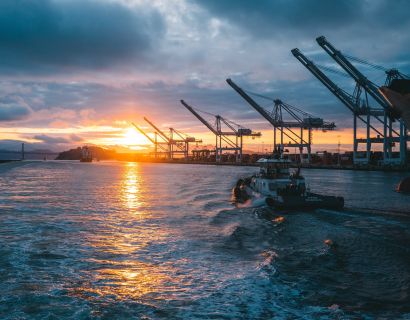Everything for  Business
Business
 Business
Business
 Business
Business
Boom in shipping Covid-19 spurs land fever near ports Surge in demand for plots suitable as container storage space, increase in rents and property values Ports don't have enough space to store containers. This leads to a land rush in

Boom in shipping Covid-19 spurs land fever near ports
Surge in demand for plots suitable as container storage space, increase in rents and property values
Ports don't have enough space to store containers. This leads to a land rush in a dark corner of the real estate market.
Logistics companies and port operators are looking to lease vacant land near container terminals, raising rents and property values and encouraging more investment in coastal open storage.
This land rush is the latest example of how shipping growth, driven by strong consumer demand for goods during the Covid-19 pandemic, is shaking up the real estate sector.
From desired residences to major commercial transactions.
E-commerce has already turned warehouses and fulfillment centers into one of the hottest types of real estate. Currently, vacant areas that can be used to stack loaded containers waiting to be connected by rail or trucks are experiencing a surge in demand.
The Georgia Ports Authority, which manages the Port of Savannah, said it had leased six sites in Georgia, Alabama and North Carolina and turned them into pop-up container vaults. Savannah is one of the country's largest and fastest-growing ports, but does not have enough space to store the growing number of containers arriving at its terminals.
In the past, loaded containers remained at the port for four to five days before moving on, port regional manager Thomas Wyville said at a conference hosted by commercial real estate trading group NAIOP Inc. last week.
Now, containers often sit for eight to 10 days, taking up space and making it difficult for the next ships to unload their cargo. "You have to remove the containers from the terminal," he said. Pop-ups are designed to help with this.
Rents are rising fastest near ports in densely populated urban areas that have less free land, such as Long Beach, California. Los Angeles' industrial property vacancy rate was just 0.5% in the first quarter, according to CBRE Group Inc.
"In Los Angeles, if you don't dig up some more ocean, you won't have any more terminals, and it's the same in New York and New Jersey," said Curtis Spencer, executive director of customs and logistics consulting firm IMS Worldwide Inc., which is involved in the development of container shipping in the domestic empire of Southern California.
Logistics companies, squeezed by growing demand and labor shortages, are struggling to get containers out of port quickly, exacerbating the problem. Storing empty containers is another challenge for ports across the U.S.
There are several sections near ports that are quite large and have easy access to roads or railways.
Zoning is also a concern: local regulations often restrict intensive industrial use and make it illegal to stack containers on top of each other. This raises the rent for those few sites that tick all the boxes.
"We're seeing huge demand for these places," said Matthew Pfeiffer, co-managing partner of real estate investment firm Alterra Property Group, which owns a number of properties near ports and wants to buy more.
Demand has grown so much that in some cases the rents for vacant land are as high as for buildings.
Alterra is considering demolishing a building near Savannah's port used by a building materials company after receiving requests from companies needing earth to stack containers, Mr Pfeiffer said.
Some companies are becoming increasingly creative as they look for space. Container storage company Chunker said it has signed agreements to use empty Sears department stores and their parking lots near California ports to unload containers, according to Chief Executive Brad Wright.
Mr Spencer of IMS Worldwide said he expects pop-up repositories to become a permanent phenomenon because the fundamental problem of shipping growth and land shortages will not go away. "It's just taking the edge off the terminal now," he said. "What if I grow 5% next year? I have to find a place for that."
 The Sunbelt Land Boom Brings Big Profits and Big Risks
The Sunbelt Land Boom Brings Big Profits and Big Risks
 Asia's office life revives in Hong Kong and Singapore
Asia's office life revives in Hong Kong and Singapore
 America's Office Surplus Began Decades Before the Pandemic
America's Office Surplus Began Decades Before the Pandemic
 Member-only clubs are popping up all over Manhattan, providing an alternative social center and workspace as New Yorkers spend less time in the office.
Member-only clubs are popping up all over Manhattan, providing an alternative social center and workspace as New Yorkers spend less time in the office.
 The shopping boom in Brooklyn's trendy Williamsburg neighborhood is the latest sign that remote work is helping to revitalize retail real estate in New York City's residential neighborhoods.
The shopping boom in Brooklyn's trendy Williamsburg neighborhood is the latest sign that remote work is helping to revitalize retail real estate in New York City's residential neighborhoods.
This site uses cookies and other visitor identifiers for the convenience of each user. If you stay on our site after reading this message, it means that you have no objection to the use of these technologies. Learn more
